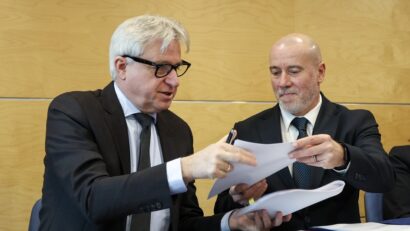The new Fiscal Code has been promulgated
The new Fiscal Code has been promulgated by president Klaus Iohannis, and the decision was hailed by prime minister Victor Ponta, in a message posted on a social network.

Corina Cristea, 08.09.2015, 14:11
Sent back to Parliament in July by president Klaus Iohannis, and endorsed again by the legislature last week, the new Fiscal Code has been promulgated by the president, who also explained the decision he made in summer.
Klaus Iohannis: “No debate had been held on the draft. The Fiscal Code bill had not been debated even a little by civil society, before it passed the first time. I thought that was inappropriate, and also thought it needed a wider debate. This actually happened after it was sent back to parliament, and I can say the debate that took place afterwards met expectations.
The new version of the Fiscal Code includes all amendments agreed upon last week by the leaders of the political parties, as well as a series of technical proposals forwarded by several institutions. The reduction of the VAT to 20% as of January 2016, and further to 19% on January the 1st 2017, a date when the tax on special constructions and the additional excise on fuel will also be eliminated, are some of the best known measures stipulated by the new Fiscal Code.
Other provisions have been less debated, but their impact should not be overlooked either. One of them refers to the possibility of local councils to levy taxes five times higher than usual for buildings and plots of land in improper condition and situated in built up areas. The decision to include a building or a plot of land into this category should be made at local level.
The implementation procedures are established at the same level. Also, taxes on buildings which are privately owned are also increased. The object of taxation is also changed, the classification being made depending on the type of building and its destination, residential or not, that is. In exchange, companies employing people included in vulnerable categories are exempt from paying taxes on buildings and land.
The tax on special constructions will be eliminated as of early next year, but only for investments in agriculture. At the same time, the new fiscal code postpones until 2017 slashing the tax on dividends from 16 to 5%. Economic analyst Ionel Blanculescu, honorary advisor to Prime Minister Victor Ponta, said on Radio Romania that the slash in the VAT will contribute to reducing tax evasion and will encourage consumption.
Tax consultant Adrian Benta, however, believes that the new legislation tends to shift the burden of taxation from legal bodies to natural persons, and brings a number of drawbacks to small businesses, such as 20 times higher incomes for dwellings which are being used as headquarters of companies. Another increase refers to the introduction of additional taxes on pensions.






























